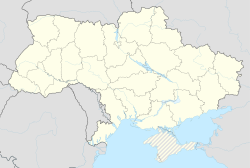Trachimbrod
| Trochinbrod / Zofjówka | |
|---|---|
| Shtetl (completely destroyed) | |
 Zofjówka Post Office, Wołyń Voivodeship, Poland, before the Holocaust and Shtetl's meticulous eradication |
|
|
Zofiówka location in World War II, east of Łuck |
|
| Coordinates: 50°55′15″N 25°41′50″E / 50.92083°N 25.69722°ECoordinates: 50°55′15″N 25°41′50″E / 50.92083°N 25.69722°E | |
| Country |
|
| Founded | 1835, Russian Empire |
| Destroyed | 1942, occupied Poland (now Ukraine) |
| Named for | Sofia of Württemberg |
| Area | |
| • Total | 6.99 km2 (2.70 sq mi) |
| Website | A Lost History |
Trochenbrod or Trohinbrod, also in Polish: Zofjówka , or in Russian: Софиевка (Sofievka), in Ukrainian: Трохимбрід (Trokhymbrid), Hebrew: טרוכנברוד, was an exclusively Jewish shtetl – a small town, with an area of 1,728 acres (6.99 km2) – located in the gmina Silno, powiat Łuck of the Wołyń Voivodeship, in the Second Polish Republic. Following the invasion of Poland by Nazi Germany and the Soviet invasion of Poland in September 1939, Zofjówka (official Polish name) was renamed in Russian and incorporated into the new Volyn Oblast of the UkSSR. Two years later, at the start of Operation Barbarossa in 1941, it was annexed by Nazi Germany into the Reichskommissariat Ukraine under a new Germanized name. Trochenbrod (Zofjówka) was completely eradicated in the course of German occupation and the ensuing Holocaust. The town used to be situated about 30 kilometres (19 mi) northeast of Łuck in the Kresy macroregion (present-day western Ukraine). The nearest villages of today are Yaromel (Яромель) and Klubochyn (Клубочин).
The original settlement inhabited entirely by Jews, was named after Sophie, a Württemberg princess (1759–1828) married to the Tsar of Russia Paul I (hence Sofievka or Zofjówka). She donated a parcel of land for the Jewish settlement in the Russian Partition after the conquest of the Polish–Lithuanian Commonwealth (see new Pale of Settlement district).
...
Wikipedia


